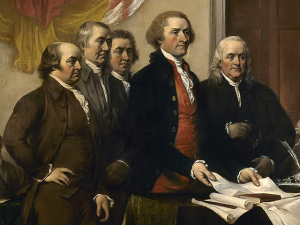Some people don’t like it, but I enjoy it when DST arrives. The idea of being able to do things at night time when it is still light outside appeals to me, and provides a stark psychological contrast to the winter when darkness pretty much pervades your entire day. This article states that although Ben Franklin floated the idea of DST, it was not actually implemented until WWI.
The Ages of the American Founding Fathers
 In honor of the Fourth of July, I decided to write some brief thoughts on the ages of the American Founding Fathers. My interest in this topic was piqued when I saw a post over at Kottke blog that lists the ages of some of the most important people of the American Revolution. It is honestly quite shocking when you see that many of these figures would be considered “kids” by today’s standards.
In honor of the Fourth of July, I decided to write some brief thoughts on the ages of the American Founding Fathers. My interest in this topic was piqued when I saw a post over at Kottke blog that lists the ages of some of the most important people of the American Revolution. It is honestly quite shocking when you see that many of these figures would be considered “kids” by today’s standards.
Ages as of July 4, 1776
Here are the ages of some key figures that the site lists:
- Marquis de Lafayette, 18
- James Monroe, 18
- Gilbert Stuart, 20
- Aaron Burr, 20
- Alexander Hamilton, 21
- Betsy Ross, 24
- James Madison, 25
It is boggling to the mind when you consider the timeless ideals associated with the American Revolution, only to then realize that some of these may have come from the minds of people who would be unable to purchase alcohol today.
But doing some further digging, I found that not all of the American Founding Fathers were on board the youth train. George Washington was a more “respectable” age of 44 in 1776, Samuel Adams was 54, John Hancock was 39, Thomas Jefferson was 33, Patrick Henry was 37, Robert Morris was 42, John Adams was 41, and Roger Sherman was 55 (as a side note, Sherman has the distinction of being the only person, as far as I can tell, who signed all four of the major founding documents – Continental Association, Declaration of Independence, Articles of Confederation, and U.S. Constitution). Skimming through a number of other Founding Fathers, I noticed that most of them were over the age of 35 by 1776. I think it’s safe to say that the majority of the American Founding Fathers were in middle age and older.
Oh, and one last person who needs to be mentioned is Benjamin Franklin, who was 70 years old at the time of the signing.
A lesson about youth?
 During the Roman Republic, one of the characteristics that was esteemed in politicians was age – so much so that portrait busts would intentionally show them as old, wrinkly, and rather ugly. This would change after the rise of Augustus, but it tells us that age may be perceived quite differently from civilization to civilization. Is there something that the ages of the American Founding Fathers can teach us? I don’t think that we can state that the American Revolution was any kind of “youth movement”, even though it did involve some youthful players. I would have to research the actual roles of the younger figures listed above, but I do know that Alexander Hamilton’s involvement in the formation of the U.S. Constitution in the mid-1780s would have put him closer to 30 years old during the time of his notable contribution.
During the Roman Republic, one of the characteristics that was esteemed in politicians was age – so much so that portrait busts would intentionally show them as old, wrinkly, and rather ugly. This would change after the rise of Augustus, but it tells us that age may be perceived quite differently from civilization to civilization. Is there something that the ages of the American Founding Fathers can teach us? I don’t think that we can state that the American Revolution was any kind of “youth movement”, even though it did involve some youthful players. I would have to research the actual roles of the younger figures listed above, but I do know that Alexander Hamilton’s involvement in the formation of the U.S. Constitution in the mid-1780s would have put him closer to 30 years old during the time of his notable contribution.
I think the same general rules hold true today as they did during the time of the Revolution: with age comes wisdom, and with youth comes idealism. Leadership requires both of these, but in proper balance. Too much youthful thought can lead to rash decision, while too much elderly thought can lead to excessive caution and inability to act when needed. I think the best formula requires a heavier dose of older, experienced thought with a smaller dose of youthful idealism in order for leadership to be effective. And if there’s one thing most historians will likely agree on, it’s that the leadership of the American Founding Fathers was pretty effective.
Ages of the founders at the time of the American Revolution
I came across a blog post which mentioned something I hadn’t thought of before: the ages of the founders/greats in 1776. Here are some of them:
- Marquis de Lafayette, 18
- James Monroe, 18
- Gilbert Stuart, 20
- Aaron Burr, 20
- Alexander Hamilton, 21
- Betsy Ross, 24
- James Madison, 25
Isn’t that amazing that these people were so young at the time, even though we might think of them as wise, old figures? Think about it: how many 20-year-olds would you trust to lead the nation today? In fact, how many would you trust to lead your local municipal government? Ages being equal, I think there’s got to be a big maturity gap between the people of the eighteenth century and those of the twenty-first. Just another reason to hold historical figures in high regard.
Now, there was one figure in particular who bucked the youth train in 1776: Ben Franklin, who was 70 years old at the time. It makes me wonder how much he was able to push his vision on account of the youngsters deferring to the “wisdom” of his years.


